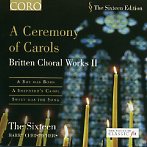This is a reconfiguration of performances that originally appeared on three different CDs in The Sixteen’s Britten Choral Works series for Collins Classics in the early 1990s. This time the program logically joins three major works for treble voices–A Ceremony of Carols, Missa brevis in D, and A Boy was Born–with three shorter Christmas-themed pieces for mixed choir. The main thing to know is that these are among the finest Britten performances you will hear–and it’s especially gratifying to experience the difficult A Boy was Born choral variations rendered with respect for the composer’s explicit interpretive markings in the score. And although it’s always nice to hear a really outstanding choir of boy trebles sing A Ceremony of Carols, the women (and a few male altos) of The Sixteen offer an irresistible crispness and polish–and flawless intonation–that’s hard to beat. Along with a vibrant Missa brevis and the rarely-heard A Shepherd’s Carol, The Sycamore Tree, and Sweet was the Song, this makes an essential set for all Britten and choral music fans. [11/3/2005]
































